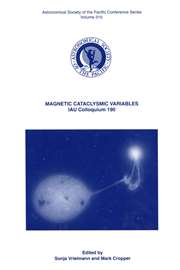No CrossRef data available.
Article contents
The Dynamics of the Galactic Bar
Published online by Cambridge University Press: 12 April 2016
Extract
The dynamics of formation and evolution of structure in barred galaxies is subtle and will require many and detailed observations to discriminate between the alternative hypotheses. Why should someone interested in such problems consider the Milky Way? In terms of data volume, our knowledge of the Milky Way is vast and the availability of detail is its major advantage. In principle, one can study morphological details such as orientations, strengths of asymmetries and kinematics details such as velocity field/pattern speeds using a wide variety of tracers. To illustrate, theorists have not converged on a single mechanism to explain bars (witness the instability vs. secular formation debate). It is possible that both operate in different regimes depending on internal or external influences: internally, triaxialities and misalignments in the bulge, spheroid or halo can apply torques and drive angular momentum waves which saturate to form a bar; and externally, satellite galaxies can exchange orbital angular momentum with its disturbance which has the similar effect. In short, if the Galaxy is indeed barred, it may hold clues to some of the detailed problems posed at this meeting.
- Type
- Part IX. The Galaxy as a Barred Spiral
- Information
- Copyright
- Copyright © Astronomical Society of the Pacific 1996


